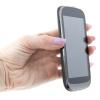Related Content
 |
NASA SPHERES Sending Google Technology to Space NASA and space exploration just became more like something out of the realm of science fiction—and Google played a role in it. Beginning in October, NASA's satellites known as SPHERES will begin to incorporate Google’s Project Tango technology in an effort to help NASA increase overall efficiency. |
|
 |
Google Acquires Word Lens Translation App Google recently acquired Quest Visual, maker of the Word Lens translation app. Word Lens uses built-in cameras on smartphones to quickly scan and identify foreign text and then translate and display the words in another language. Anuj Magazine examines the possible strategy driving the acquisition. |
|
 |
Best Selfie Ever: NASA's Global Earth Day NASA had an ambitious event this year to create a “global selfie,” a crowd-sourced mosaic image that would resemble Earth as it appeared from space on Earth Day—and more than 50,000 people responded. The result is a zoomable 3.2 gigapixel image built with more than 36,000 individual images. |
|
 |
Heart-Monitoring Smart Devices Missing a Beat Smart devices used by fitness junkies tout the ability to measure heart rate. Yet, a recent report by CNET revealed that most of the heart rate monitoring functions for smart devices are missing a beat—literally. Some devices are unable to find a pulse when the heart rate reaches a certain range. |
|
 |
Why Facebook's Unbundling Strategy May Be Good for Its Future In a recent interview, Mark Zuckerberg mentioned the need to create single-purpose, first-class experiences to capture the attention of mobile users. One of the approaches Facebook is considering is unbundling the features offered for its mobile app. |
|
 |
Why Microsoft Launched Office for iPad as a Freemium Offering Microsoft recently announced the availability of Office for iPad as a freemium offering. Freemium combines two types of business models—free and premium. Anuj Magazine explores why Microsoft chose to go the freemium route for Office for iPad and how product strategy played into the decision. |
|
 |
Turning Smartphones into a Supercomputer Smart devices can now become super devices with the Power to Give initiative from HTC. The initiative aims to empower smartphones to become a collective supercomputer and to harness their unused power to solve complex problems—such as finding cures for Alzheimer's disease and AIDS. |
|
 |
Mobile Addiction Could Mean Highs for Mobile Developers The percentage of mobile addicts—defined as a user who launches a mobile app or opens a mobile process more than sixty times a day—has grown by 123 percent in the past year. This could be a fortunate trend for those looking for a little job security in mobile development and testing. |




